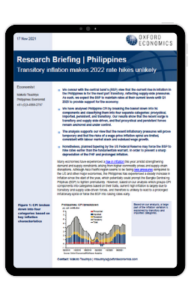Philippines | Transitory inflation makes 2022 rate hikes unlikely

We concur with the central bank’s (BSP) view that the current rise in inflation in the Philippines is for the most part transitory, reflecting supply-side pressures. As such, we expect the BSP to maintain rates at their current levels until Q1 2023 to provide support for the economy.
What you will learn from this report:
- We have analysed Philippine CPI by breaking the basket down into 94 components and classifying them into four separate categories: procyclical, imported, persistent, and transitory. Our results show that the recent surge is transitory and supply side-driven, and that procyclical and persistent forces remain anchored and under control.
- The analysis supports our view that the recent inflationary pressures will prove temporary and that the risks of a wage-price inflation spiral are limited, consistent with labour market slack and subdued wage growth.
- Nonetheless, planned tapering by the US Federal Reserve may force the BSP to hike rates earlier than the fundamentals warrant, in order to prevent a sharp depreciation of the PHP and prolonged inflation.
Tags:
Related Services

Post
House prices continue to slide for China’s cities
Research Briefing Philippines | Transitory inflation makes 2022 rate hikes unlikely While the property market downturn has been universal, the scale and depth has been varied for different cities and regions.
Find Out More
Post
The Construction Productivity Challenge in Australia
Delve into the state of construction productivity in Australia. Understand the factors affecting growth and how innovation can transform the industry for the better.
Find Out More